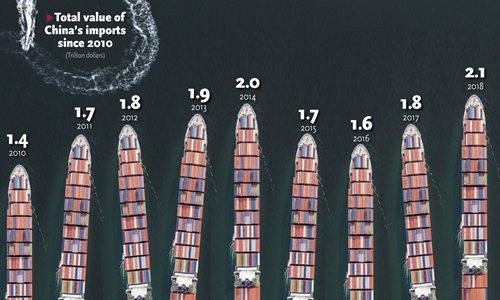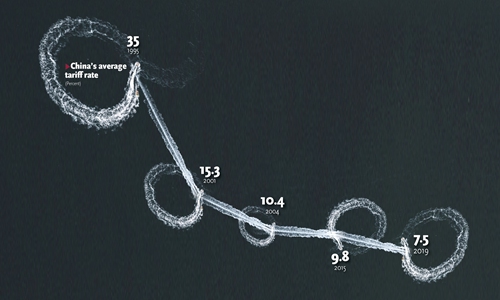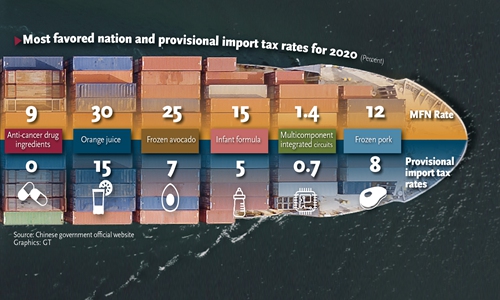Tariffs to fall on hundreds of products
China’s new round of duty cuts will benefit trading partners, serve domestic needs

China's measures to cut duties on more than 850 items will provide new development opportunities for trading partners, while better serving domestic consumers and promoting consumption upgrading, experts said on Monday.
The Customs Tariff Commission of the State Council, China's cabinet, announced on the same day that it would cut or eliminate import tariffs on some items from January 1, 2020.
More than 850 items - from frozen pork to orange juice and high-technology products - will be subject to provisional import tariff rates that are lower than most-favored nation (MFN) rates, according to a statement on the website of the Ministry of Finance.
The duty rate on frozen avocados will be cut from 25 percent to 7 percent, and that for frozen pork will be reduced from 12 percent to 8 percent, it said.
To reduce the costs of medicines and boost the production of new medicines, duties on the raw materials for some pharmaceutical products will be removed, such as treatments for asthma and diabetes, it said.
"This move shows China is going a step further than international common rules," Li Yong, deputy chair of the expert committee of the China Association of International Trade, which is affiliated with the Ministry of Commerce, told the Global Times on Monday.
On one hand, the latest round of opening-up will provide new opportunities for China's trading partners, and on the other, the move will let domestic consumers enjoy foreign premiums goods that offer high quality and low prices, Li said.

"China is fulfilling its pledge to expand opening-up and lower duties made when it acceded to the WTO in 2001," Cong Yi, a professor at the Tianjin University of Finance and Economics, told the Global Times.
China's average effective tariff rate on merchandise imports dropped to 7.5 percent in 2019, public data showed.
Promoting free trade
To accelerate the building of free trade zones with high standards, the commission said the country will continue to apply conventional tariffs on products from 23 countries and regions, including additional tariff reductions targeting countries such as New Zealand, Australia and Pakistan, under free trade agreements those countries have signed with China.
The adjustment measures will help improve opening-up, continuously expand trade potential and accelerate the building of free trade zones with high standards, the commission said.
Chen Haiou, president of China-Pakistan Border Trade Zone Management Co, told the Global Times on Monday that trade with Pakistan via the zone has surpassed 10 million yuan ($1.43 million) since the zone officially opened in October, with imports - including Indian Ocean seafood, nuts, crafts and textile products - from Pakistan accounting for 90 percent.
"These goods are very popular among Chinese consumers, with many orders already received," Chen said. As no duties are imposed on imports via the zone, he said his company plans to increase imports to at least 100 million yuan in 2020 to satisfy domestic needs.
The move also partially serves to realize for a phase one trade deal between China and the US, according to experts.
The two sides agreed on the text of a phase one economic and trade agreement in mid-December. Though details have not been disclosed, Chinese enterprises will increase agricultural imports from the US, the Xinhua News Agency reported on December 14.

Industrial upgrading
Apart from common trade, the commission also placed an emphasis on lower duties on imports of advanced technologies, equipment and components, including integrated circuit products.
It also said it would reduce the MFN rates for 176 information technology products, while adjusting the temporary import tariff rates of some information technology products, starting from July 1, 2020.
While China constantly promotes independent innovation, it still needs imports of high technology products amid globalization, which will help promote the country's industrial structure adjustment and upgrading, Cong said.
However, Liu Kun, a Beijing-based semiconductor industry analyst, told the Global Times on Monday that lowering duties on information technology products will ease supply shortages and alleviate pressure brought by US threats to restricts chip supplies to China.
"The China-US trade tensions have rung a warning bell for domestic companies. They are now seeking chip alternatives to the US," Liu said, noting that US chips will gradually be replaced in the Chinese market whether duties are lowered or not.